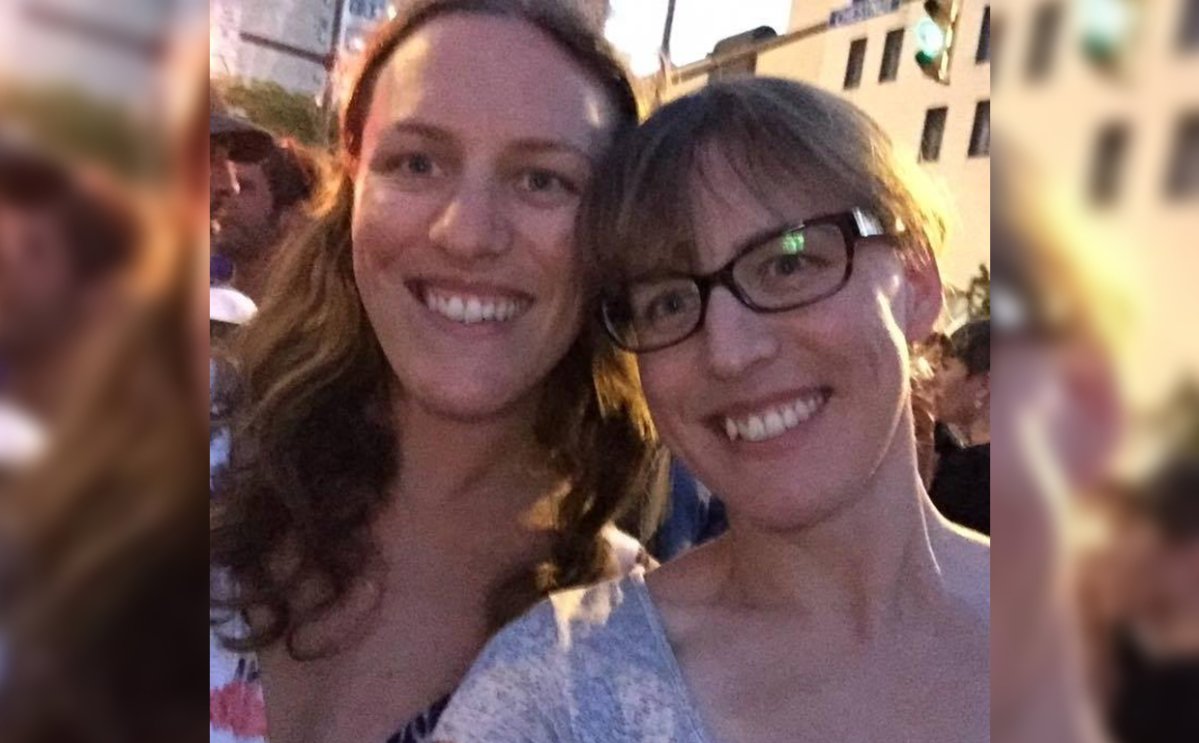Before her identical twin sister Metta Siebert was diagnosed with breast cancer, Hanna Thompson didn’t give a second thought to the lump she’d recently found in her right breast.

At the time, she was breastfeeding her now-15-month-old son and thought it was just a clogged milk duct.
But within weeks, the two both found themselves diagnosed with Stage 2A breast cancer, a stage of the disease that usually responds well to treatment.
“After Metta was diagnosed, I saw my doctor and they sent me to get a mammogram and then a biopsy on the same day,” Thompson told Good Morning America. “About a month later, I had my first chemo.”
Both Siebert and Thompson share BRCA2, a gene which, when mutated, greatly increases the risk of developing both breast and ovarian cancer.
Once they finish chemotherapy, both sisters plan to have a double mastectomy, a procedure that stars like Angelina Jolie went under to avoid a similar diagnosis.
- Ex-cop accused of slaying 2 women, abducting child, kills himself in police chase
- U.S. is sending Ukraine longer-range weapons with new aid. Why it matters
- Four injured after military horses break loose, stampede in London, U.K.
- Dolphin washes up on beach with bullets lodged in spine, heart and brain
The 35-year-olds’ bond is growing stronger than ever, they told Good Morning America, and they now talk multiple times a day about treatment plans and how they’re going to shave their heads.
READ MORE: Nasty ‘clean up’ letter unites community behind mom whose son has cancer
“We’re talking all the time,” Siebert said. “Metta is being hit hard by her chemo so I’m there to discuss it and offer options from my doctors and just commiserate.”
She continued: “I think that is just bonds you in a whole other way that you didn’t think you were going to be bonded in or ever wanted to be bonded in. If there’s one shimmer of life in this terribleness it’s that at least I have my sister with me.”
According to the American Cancer Society, having a first-degree relative (meaning a mother, sister or daughter) with breast cancer almost doubles a woman’s risk.
Women with a father or brother who have had breast cancer also have a higher risk of diagnosis.
Fewer than 15 per cent of women with breast cancer have a family member with this disease, making the sisters’ diagnoses a statistically rare occurrence.
WATCH BELOW: Woman cycles across Canada to raise awareness for ovarian cancer

Justin Lorentz, a genetic counsellor at Sunnybrook Odette Cancer Centre, told Global News that the function of the BRCA2 gene is to repair DNA which, as a result, protects people from cancer.
“If someone has a mistake or mutation in their BRCA2 gene, they are called a ‘carrier’ and they aren’t as protected from certain cancers,” he said. “These gene mutations are inherited from one generation to the next, so what we look for are people who have a personal and family history of early-onset cancer.”
To test for BRCA2, patient DNA is collected from blood or saliva and sent to a lab where scientists read through genes like a book, looking for spelling mistakes or, in science terms, genetic mutations.
“Collecting DNA is simple; analyzing genes for mutation can be tricky,” he said.
READ MORE: Dominic LeBlanc makes first public appearance in months following cancer diagnosis
Even if two sisters — and twins, no less — are BRCA2 carriers, it’s rare to see a story like Metta and Thompson’s.
“It’s unusual for identical twins to be diagnosed with breast cancer at the same time,” he said. “We don’t have the ability to predict if, or when, a woman will get cancer if she has a BRCA2 mutation, so cases like this still take us by surprise.”
It’s important to note, Lorentz says, that only five to 10 per cent of cancers are thought to be hereditary or caused by gene mutations.
“Women with BRCA2 gene mutations are at highest risk for breast cancer and ovarian cancer,” he said. “We screen for breast cancer in these women with annual mammograms and MRIs with the goal of detecting cancer early.”
“Carriers can drastically reduce risk of breast cancer by having mastectomies,” he continued. “It’s a very personal decision that involves discussions about risks and benefits with medical specialists.”
The sisters have started a GoFundMe to raise money to cover their hospital costs as they both prepare for double mastectomies.
—
meaghan.wray@globalnews.ca





Comments